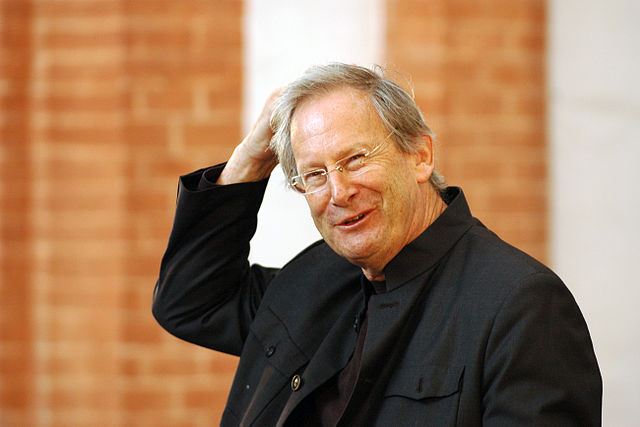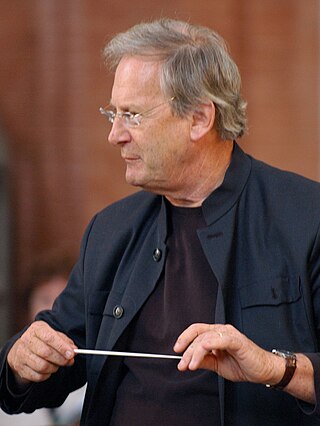John Eliot Gardiner
English conductor (born 1943) From Wikipedia, the free encyclopedia
Sir John Eliot Gardiner (born 20 April 1943)[1] is an English conductor, particularly known for his performances of the works of Johann Sebastian Bach, especially the Bach Cantata Pilgrimage of 2000, performing Bach's church cantatas in liturgical order in churches all over Europe, and New York City, with the Monteverdi Choir, and recording them at the locations.
Sir John Eliot Gardiner | |
|---|---|
 Gardiner in rehearsal, 2007 | |
| Born | 20 April 1943 Fontmell Magna, Dorset, England |
| Education | Bryanston School |
| Alma mater | King's College, Cambridge King's College London |
| Occupation | Conductor of classical music |
| Years active | 1964–Present |
| Spouses | Elizabeth Wilcock
(m. 1981; div. 1997)Isabella de Sabata
(m. 2001; div. 2019) |
| Children | 3, including Francesca Gardiner |
| Father | Rolf Gardiner |
| Relatives | Alan Gardiner (grandfather) Margaret Gardiner (aunt) Martin Bernal (cousin) Howard Hodgkin (cousin) |
Life and career
Summarize
Perspective
Born in Fontmell Magna, Dorset, son of Rolf Gardiner and Marabel Hodgkin, Gardiner's early musical experience came largely through singing with his family and in a local church choir. As a child he grew up with the celebrated Haussmann portrait of J. S. Bach, which had been lent to his parents for safe keeping during the Second World War.[2] A self-taught musician who also played the violin, he began to study conducting at the age of 15. He was educated at Bryanston School, then studied History at King's College, Cambridge, where his tutor was the social anthropologist Edmund Leach.[3][4]

While an undergraduate at Cambridge he launched his conducting career with a performance of Monteverdi's Vespro della Beata Vergine in King's College Chapel on 5 March 1964.[5] This either featured or led to the foundation of the Monteverdi Choir, with which he made his London conducting debut at the Wigmore Hall in 1966.[3] Whilst at Cambridge, he conducted the Oxford and Cambridge Singers on a concert tour of the Middle East.[3] After graduating, Gardiner continued his musical studies at King's College London under Thurston Dart and in Paris with Nadia Boulanger, whose music had been a very early influence.[6]
Returning to England, Gardiner joined the BBC Northern Orchestra as an apprentice conductor.[6] In 1968 he founded the Monteverdi Orchestra. Upon changing from modern instruments to period instruments in 1977, the orchestra changed its name to the English Baroque Soloists in 1978.[7][8] In 1969 Gardiner made his opera debut with a performance of Mozart's The Magic Flute at the English National Opera. Four years later, in 1973, he made his first appearance at the Covent Garden conducting Gluck's Iphigénie en Tauride. The English Baroque Soloists made their opera debut with him in the 1977 Innsbruck Festival of Early Music, performing Handel's Acis and Galatea on period instruments. His American debut came in 1979 when he conducted the Dallas Symphony Orchestra. He then became the lead conductor of Canada's CBC Vancouver Orchestra from 1980 to 1983.[9]
After his period with the CBC Vancouver Orchestra, Gardiner went to France. From 1983 to 1988 he was Music Director of the Opéra National de Lyon. During his period with the Opéra he founded an entirely new orchestra.[10] During his time with the Opéra National de Lyon Gardiner was also Artistic Director of the Göttingen Handel Festival (1981 until 1990).[11] In 1989 the Monteverdi Choir had its 25th anniversary, touring the world giving performances of Handel's oratorio Israel in Egypt and Bach's Magnificat among other works. In 1990, Gardiner formed a new period-instrument orchestra, the Orchestre Révolutionnaire et Romantique, to perform music of the 19th century. From 1991 until 1995 he was principal conductor of the North German Radio Symphony Orchestra.
He founded the Monteverdi Choir (1964), the English Baroque Soloists (1978) and the Orchestre Révolutionnaire et Romantique (1989). From the 1990s onwards he undertook more world tours with his ensembles, including:
- A European tour in 1993 with the Orchestre Révolutionnaire et Romantique featured Berlioz's rediscovered Messe solennelle. Beginning in Bremen, Germany the tour ended with a recorded performance in Westminster Cathedral, London 1993.
- In 2000, Gardiner set out on his Bach Cantata Pilgrimage, performing, over a 52-week period, all of Bach's sacred cantatas in churches around Europe and the United States.[12]
- In late 2004, Gardiner toured France and Spain with the Monteverdi Choir performing pieces from the Codex Calixtinus in cathedrals and churches along the Camino de Santiago.[13]

Gardiner has recorded over 250 albums, most of which have been published by Deutsche Grammophon and Philips Classics,[14] and by the Soli Deo Gloria label, which specialises in recordings by Gardiner and by his ensembles.
Gardiner is most famous for his interpretations of Baroque music on period instruments with the Monteverdi Choir and the English Baroque Soloists, but his repertoire and discography are not limited to early music. With the Orchestre Révolutionnaire et Romantique Gardiner has performed a wide range of Classical and Romantic music, including many works of Berlioz and all of Beethoven's symphonies. A recording of the third symphony of the latter was used in a dramatisation by the BBC of Beethoven's writing of that symphony.[15] Gardiner has served as chief conductor of the North German Radio Symphony Orchestra and has appeared as guest conductor with such major orchestras as the Berlin Philharmonic, Boston Symphony Orchestra, Chicago Symphony Orchestra, Cleveland Orchestra, London Symphony Orchestra, Philharmonia, Royal Concertgebouw Orchestra and Vienna Philharmonic. Gardiner is also well known for his refusal to perform the music of Richard Wagner; in a 2008 interview for Gramophone Gardiner said, 'I really loathe Wagner – everything he stands for – and I don't even like his music very much.'[16] Gardiner has been the subject of various allegations of rudeness and bullying of performers and colleagues.[17][18][19]
In late 2012, citing health concerns, he cancelled his planned December 2013 tour of Australia with the Monteverdi Choir and the Australian Chamber Orchestra.[20] In 2013, Gardiner published the book Bach: Music in the Castle of Heaven.[21] In 2014 he started a five-year term as President of the Leipzig Bach Archive, being succeeded by Ton Koopman in that position in 2019.[22][23] One of the realisations during Gardiner's presidency was the Archive's collaboration to the Bach 333 box set with the complete recordings of Johann Sebastian Bach's works, released in 2018.[24]
Gardiner conducted his Monteverdi Choir and English Baroque Soloists in a pre-service concert at Westminster Abbey for the Coronation of King Charles III.
Controversies
In August 2023, Gardiner was reported to have angrily slapped and punched English bass singer William Thomas in the face in front of cast members after Thomas exited the wrong side of the podium after a performance of Les Troyens at the Berlioz Festival in La Côte Saint André. The incident resulted in a public backlash against the conductor.[25][26] On 24 August 2023, Gardiner withdrew from all further engagements[27][28][29][30] for 'a period of reflection and, in consultation with his medical advisors ... focusing on his mental health while engaging in a course of counselling'.[31] In July 2024 it was announced that he would be stepping down as leader and artistic director of the Monteverdi Choir and Orchestras, focusing instead on 'other activities including guest conducting, recording, writing, creative and education projects.'[32]
In September 2024, Gardiner founded the Constellation Choir and Orchestra, following his departure from the Monteverdi Choir and Orchestras earlier that year. The new ensemble attracted several former members of the Monteverdi ensembles, leading to a competitive dynamic between the groups. Some concert venues replaced scheduled Monteverdi performances with those of Gardiner's new ensemble, further intensifying the rivalry.[33]
Honours and awards
Summarize
Perspective
Gardiner has received a variety of honours and awards,[34] including:
- Honorary doctorate from the University of Lyon, 1987[14]
- Appointed Commander of the Order of the British Empire (CBE), 1990 New Year Honours, for services to music[35]
- Honorary Fellow of King's College, London and King's College, Cambridge
- Honorary Member of Royal Academy of Music, 1992[14]
- Grammy, Best Choral Performance, 1994[36]
- Appointed Knight Bachelor, 1998 Birthday Honours, for services to music[37][38]
- Grammy, Best Opera Recording, 1999[36]
- Bach Medal, 2005[39]
- Order of Merit of the Federal Republic of Germany, 2005[40]
- Doctorate Honoris Causa in Musicology at the University of Pavia in Cremona (birthplace of Claudio Monteverdi), 2006[14][41]
- Bach Prize of the Royal Academy of Music-Kohn Foundation, 2008[14]
- Voted into the Gramophone Hall of Fame in 2012[42]
- Chevalier de la Légion d'honneur, 2011.
- Honorary Degree of Doctor of Music from the University of St Andrews, 2014[43]
- National Book Critics Circle Award (Biography) shortlist for Bach: Music in the Castle of Heaven, 2014[44]
- Honorary Degree of Doctor of Music from the University of Cambridge, 2015
- Honorary Fellow of the British Academy, 2015[45]
- Honorary doctorate from the Franz Liszt Academy of Music, 2023[46]
Personal life
Gardiner is the son of the British rural revivalist and Nazi sympathizer Rolf Gardiner (1902–1971),[47] and the grandson of the Egyptologist Alan Gardiner (1879–1963). His mother, Marabel Hodgkin, was a member of the Hodgkin family, a notable Quaker family; the artist Sir Howard Hodgkin (1932–2017) was Gardiner's first cousin.[48]
Gardiner was married to violinist Elizabeth Wilcock from 1981 to 1997;[citation needed] they have three daughters, including screenwriter and showrunner Francesca Gardiner.[49] From 2001 to 2019 he was married to Isabella de Sabata,[50] granddaughter of conductor Victor de Sabata.[51]
In his spare time, Gardiner runs a farm at Springhead near Fontmell Magna[52] in North Dorset, which was established by his great-uncle, composer Henry Balfour Gardiner. His continued involvement in this project has earned him the nickname 'Uphill Gardiner' as a consequence of his unorthodox farming methods.[53]
In August 2014, Gardiner was one of 200 public figures who were signatories to a letter to The Guardian opposing Scottish independence in the run-up to September's referendum on that subject.[54]
Selected publications
See also
- Soli Deo Gloria record label
References
External links
Wikiwand - on
Seamless Wikipedia browsing. On steroids.
